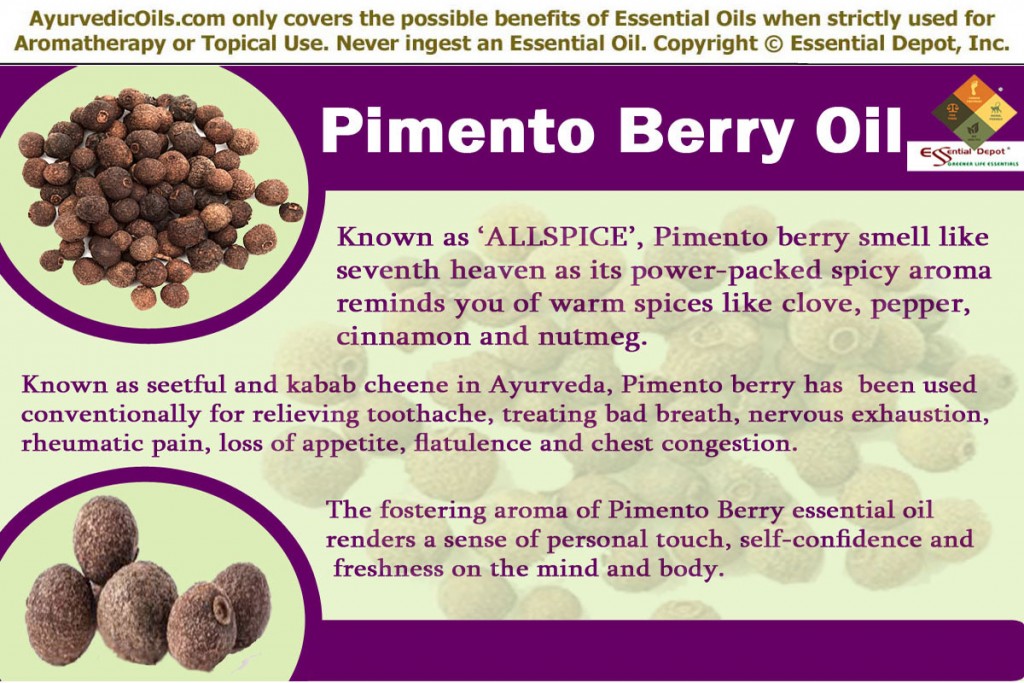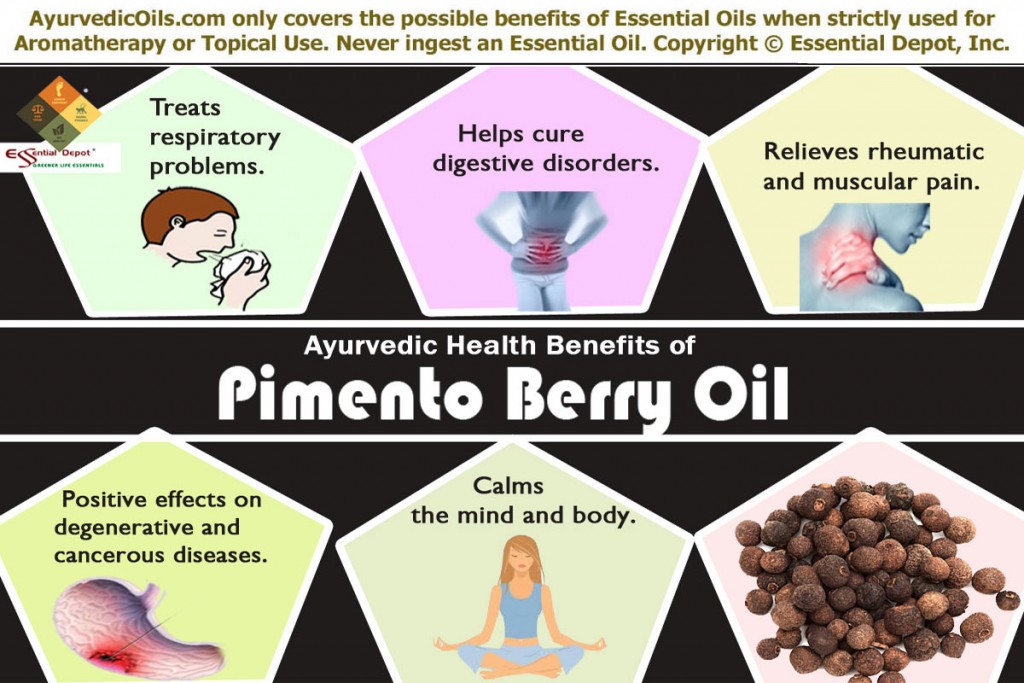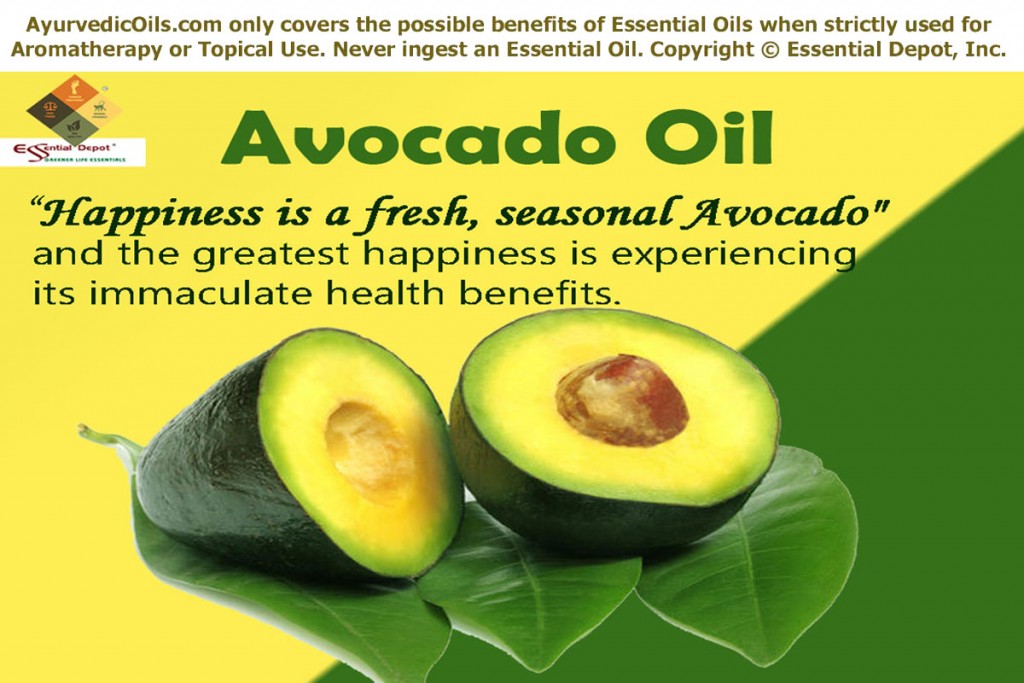 ‘Happiness is a fresh, seasonal Avocado’, is the most stirring quote that made me rapt in the recent times. What is all in an Avocado that brings so much joy to humanity?
‘Happiness is a fresh, seasonal Avocado’, is the most stirring quote that made me rapt in the recent times. What is all in an Avocado that brings so much joy to humanity?
Avocado is nature’s souvenir that has been trusted and taken for treating cardiovascular problems, psoriasis, periodontal conditions, obesity, diabetes, wrinkles, halitosis, hair loss and numerous other medical conditions.
“Avocado is sweet and warm, excellent for the liver, high in vitamin E, is a skin moisturizer, and is good for weak tissues”, quotes Light Miller and Bryan Miller in their book ‘Ayurveda and Aromatherapy.
Called as Neerabijh (Sanskrit) or Makhanphal (Hindi) in Ayurveda, Avocado is employed in Ayurvedic healing as a skin tonic and for reducing bad cholesterol and chronic constipation; boosting libido, regulating insulin secretion, fighting against free radicals, enhancing ojas (strength, endurance and brilliance); and for treating alopecia, insomnia and joint pain.
Purchase Avocado Oil – Retail – 1 Quart – CLICK HERE
Purchase Avocado Oil – Wholesale – 1 Gallon – CLICK HERE
Remedial properties and chemical constituents of Avocado oil:
Avocado is nature’s source of power with vitamins, including vitamin A, C, E, B-6 and K1 along with riboflavin, folate, niacin, choline, dietary fiber, proteins, pantothenic acid, magnesium, potassium, zeaxanthin/lutein, PFA (polyunsaturated fatty acid), (fatty acids namely Linoleic, Palmitoleic, Palmitic, Oleic, Stearic acid) MUFA(Monounsaturated fatty acid) and SFA (Saturated fatty acid).
Avocado oil contains remedial phytosterols like campesterol, beta-sitosterol and stigmasterol and bio-active phytochemicals including terpenoids, glutathione, carotenoids, phenols, tannins, lecithin, sterolin, D-mannoheptulose and persenone A and B.
Botanically called as Persea Americana, Avocado oil has anti-carcinogenic, demulcent, laxative, emollient, antiparasitic, carminative, astringent, regenerative, diuretic, cardiovascular, detoxifying, anti-inflammatory, antioxidant, analgesic, anti-aging and anti-arthritic properties.
Historical uses and significance of Avocado oil:
Avocado is said to have been born in Mexico in the state of Puebla, though various substantiations from fossil testing states that it might have originated in California. It is recorded as one of the most primitive fruits consumed by the Mesoamerican populace, including the Maya, Olmec and the Mokaya of the Soconusco.
The ancient proof of Avocado’s presence in Mexico dates back to 10,000 BC. The leading producers of Avocado are Mexico with 500,000 tons per year, followed by California with 200,000 tons and Florida with 35,000 tons.
Avocados have been used by the Maya populace of Guatemala for diagnosing diarrhea, warding off intestinal worms and parasites and for enhancing the growth of healthy hair.
The Mexican iconography portrays Avocado and the Nahuatl term for avocado is ahuacatl, which means testicle in English. In accordance to the Mexican mythology, the fruit of avocado grants enormous energy.
Gutierrez and Villanueva, the popular Chroniclers of Spain denote Avocado as, “a fruit’s form contributes to its properties: the outer form is a result of inner forces. The avocado is shaped like a testicle, and it can therefore transfer that strength to whoever eats it.” Sounds great! Isn’t it???
It’s time to relate the effectiveness of Avocado as an immune stimulant and a sexual booster and one among the best natural alternative for delaying the aging process.
From the prehistoric times till today, Avocado and its cold-pressed magnificent oil is used in the manufacturing of soaps, shampoos, conditioners, serums, moisturizing creams, lotions, massage blends and an extensive array of cosmetic products.
Avocado is a familiar cooking oil with manifold benefits in it. It is a vital part of the popular Mexican dip, Guacamole and in corn tortillas. Salads, soups, desserts, savory dishes, snacks, sandwiches, hot dogs, hamburgers and a long-drawn-out list has Avocado as a main ingredient for its creamy taste and bulky benefits.
Ayurvedic health benefits of Avocado oil:
Avocado is an excellent remedial bliss in disguise, just like a Jackfruit that is rough on the outside and extremely sweet and smooth in the inside.
Ayurveda states that the fruit of Avocado and the oil extracted from its pulp is extremely beneficial in the treatment of vata dosha vitiations like scaly skin, psoriasis, constipation, rough and aged-skin, muscular stiffness, dry hair, joint pain, insomnia, improper blood circulation and wrinkles.
Avocado is also a promising remedy in the treatment of Pitta imbalances like poor metabolism, ulcer, tension, heartburn and inflammatory conditions.
Avocado is used in massage since the traditional times, especially for its enormous benefits to the skin.
Ayurveda denotes that all things in this universe is made up of five vital elements namely fire, earth, water, air and space and these are together known as Panchamahabhutas or the building blocks of life.
“Earth, water, fire, air, ether, mind and intellect and also ego-sense; these are the eight-fold division of my nature. This is inferior. Know my mother nature, the higher, Oh Mighty-Armed, the life-element by which the universe is upheld”. (7:4-5) – Bhagavad Gita
Earth consists of all the natural nutrients like vitamins, minerals (iron, calcium, magnesium and potassium) and phytochemicals within it. Every single plant that grows on earth observes these natural nutrients based upon its temperament and the environment in which it grows.
Since human body is also a combination of these 5 vital elements and it also contains such vital nutrients and these are responsible for the well-being of various parts of the body. Deficiency or excess of any of these natural nutrients leads to illness.
Thus treating such insufficiency with natural alternatives aids in diagnosing the illness initially and thus prevent it in the future as well.
For example, deficiency of vitamin A might end up in night blindness and other ocular effects, dry and scaly skin, respiratory infections, follicular thickening of the skin surface, low immunity and growth retardation problems in children.
Intake of natural foods that are rich in Vitamin A like carrots, sweet potato, lettuce, melon, tropical fruits and other green leafy vegetables can assist in treating the symptoms and diagnosing Vitamin A deficiency disorders.
Bright colored vegetables and fruits acquire vitamins from the earth and thus vitamin deficiencies are treated naturally by ingesting such food varieties.
In a much similar way, Avocado is rich in Vitamins C, E, B and K, potassium and monounsaturated fatty acids like oleic acid. Eating fresh Avocados and using Avocado oil for dermal use might assist in balancing such deficiencies in the system.
The most momentous Ayurvedic benefits of Avocado and its nourishing oil are as follows:
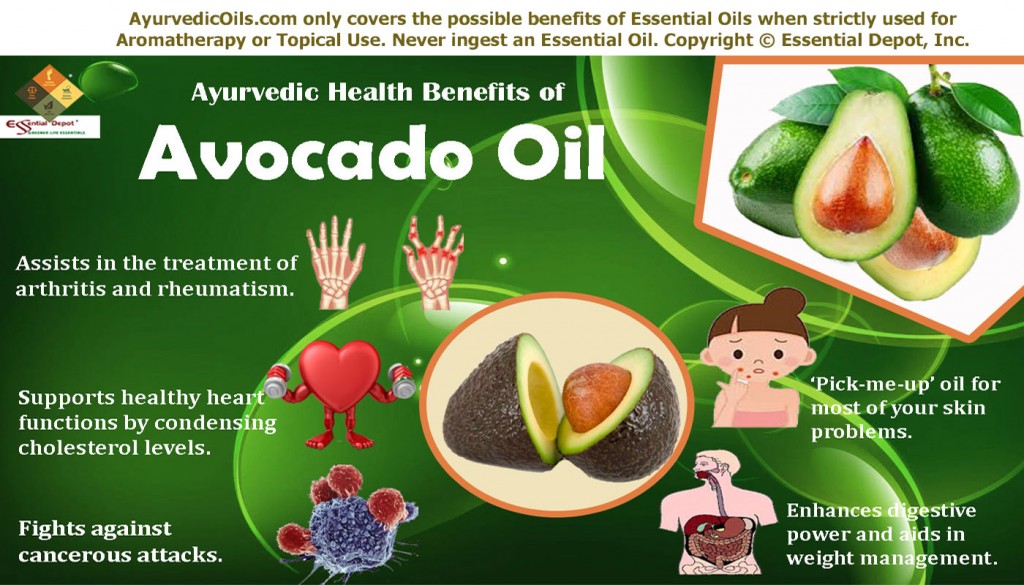 1. Assists in the treatment of arthritis and rheumatism:
1. Assists in the treatment of arthritis and rheumatism:
The presence of phytochemicals in Avocado is a healthy reason for its effectiveness in the treatment of osteoarthritis and other inflammatory conditions. It is for this reason, Avocado along with the blend of Soybean oil is recommended by Denmark as a food supplement for treating inflammation and influencing the repair and growth of cartilage.
France has determined this duo oil as prescription medicine. This is further substantiated by various research analyses published in the journal ‘Ugeschrift for laeger’ that have proved the usefulness of this blend in the healing of osteoarthritis in the knee and hip area.
“Avocado oil inhibited a pro-inflammatory cytokine molecule” states the research report published in the 2006 Journal Periodontal Disease issue, where human bone cells and periodontal ligaments were studied, thus demonstrating that Avocado oil with its anti-inflammatory values aids in reducing inflammation and preventing certain other symptoms of periodontal disease like erosion of bone.
The anti-inflammatory attribute of Avocado oil is endorsed to its rich presence of phytonutrients like polyphenols and flavonoids.
A 2007 study ‘Metabolic Effects of Avocado/Soy Unsaponifiables on Articular Chondrocytes’ published in Evidence Based Complementary and Alternative Medicine and PubMed concludes “there is substantial evidence that ASU (Avocado/Soy Unsaponifiables) containing sterols are anti-inflammatory and provide protection against cartilage degeneration.”
It further adds “The major components of ASU by weight are the phytosterols beta-sitosterol, campesterol and stigmasterol. Phytosterols in general, and beta-sitosterol in particular, are now considered potent anti-inflammatory agents with antioxidant and analgesic activity.”
Massaging the painful parts with 2 ounce of Avocado oil blended with 1 ounce of Soybean oil can be of immense help in fighting against free radicals, reducing pain, inflammation, muscular stiffness and cartilage damages and in enhancing blood circulation in the affected area.
Pranayama or conscious breathing assists in the treatment of rheumatism, atherosclerosis, arthritis and other inflammatory conditions that mainly occur due to the stagnation of toxic remains in the system, where ama or toxic substances in the body are flushed out through slow and steady exhalation.
2. Supports healthy heart functions by condensing cholesterol levels:
The presence of beta-sitosterol makes Avocado and its oil as the friendliest oil for supporting the healthy functions of your heart. This is a type of phytosterol, which is structurally alike to body’s cholesterol.
They are often termed as ‘heart healthy nutrients’ because of their efficacy in converting low healthy fats into substances that will be comparatively less detrimental to the cells and are more exploitable.
Avocado with its phytosterol components does enormous goodness to the system as its anti-inflammatory properties due to phytosterol compounds help in reducing the risk of heart diseases mainly due to deposits of plaque or other mass substances.
Avocado and its oil help in trimming down excess inflammation and clog in the arteries and thwart the arterial walls from all kinds of damages and aid in maintaining normal levels of blood pressure.
Research study on the effects of increased ingestion of Avocado has witnessed considerable decrease of cholesterol levels in blood. This analysis sustained for about 7 days with diet rich in Avocados, where patients with slight hypercholesterolemia evidenced a 17 percent drop off in the levels of total serum cholesterols.
It also evidenced about 11 percent increase in HDL (good cholesterol) and 22 percent decrease in the levels of triglyceride and LDL (bad cholesterol), thus Avocados have also been proven to support healthier lipid profiles.
Eating Avocados in salad or as whole is a great way to relay its immense benefits to your system but Avocado oil is of great significance as it exists in a more concentrated form.
Blend 4 ounce of Avocado oil with 5 drops of Ginger oil and 5 drops of Spearmint oil and rejuvenate your system with a warm massage on your weekends. Indeed it is one among the comfy way to get rid of excess cholesterol and toxic remains in your system.
3. ‘Pick-me-up’ oil for most of your skin problems:
Pick up the most capacious oil of Avocado with your eyes closed just for the treatment of most of your skin conditions.
Avocado and its nourishing pulpy oil is known for repairing the damaged skin cells, supporting the growth of new cells, moisturizing the skin, augmenting the production of collagen and for treating wrinkles, fine lines, crow’s foot and certain other symptoms of aging.
The significant factors behind the skin nourishing attribute of Avocado oil is the presence of enormous nutrients including potassium, vitamins A, D and E (act as antioxidants), sterolin, lecithin, proteins and high presence of unsaturated fatty acids including omega-3 fatty acids.
Blend 2 ounce of Avocado oil with 10 drops of Evening Primrose oil and 10 drops of Jojoba oil. Relish your skin and your senses with this rich massage blend for about twice in a week. Leave it to rest for about half an hour. Follow this massage with a cool bath and feel the difference of your skin in less than 2 months.
The presence of sterolin, unsaturated fatty acids, proteins and antioxidant vitamins in Avocado oil assists deeper penetration into the skin surface and the bloodstream.
This in turn softens, moisturizes, repairs, rejuvenates and backs up healthy skin from within. Aging spots, psoriasis, eczema, dry skin, mature skin conditions and sun damage can be treated effectively with this wholesome oil.
A 12 week study listed in the Journal of Dermatology on the effectiveness of Avocado oil and Vitamin B12 on Psoriasis evidenced regular progress in the participants suffering from psoriasis.
4. Enhances digestive power and aids in weight management:
Avocado and its oil are known to increase the efficacy and the normal functioning of the digestive tract.
The oil of Avocado has soothing effects on the intestine, stomach and the digestive system as a whole. Being a mild and gentle oil, Avocado can assist in the treatment of ulcer, heartburn, improper metabolic functions and inflammation in the stomach and intestines.
Essential fatty acids (EFAs) like omega-3 fatty acid support in improving your metabolism and boost your appetite, thus granting you a feeling of fullness with its enormous nutrient content.
A balanced and healthy diet with regular exercise, healthy lifestyle practices, proper utilization of your physical and emotional energies, meditation and supporting techniques including massage with Ayurvedic oils like Avocado and detoxification for eliminating the toxic remains in your system, is more than enough to shed your extra pounds and live fit forever.
Massaging your abdomen with 10 drops of Avocado oil mixed with 1 drop of Lemon oil and 1 drop of Peppermint oil, especially before your meals is an excellent way to nurture your appetite and soothe the lining of the stomach and intestines.
A 2014 study on the ‘Effect of Dietary Intake of Avocado Oil and Olive Oil on Biochemical Markers of Liver Function in Sucrose-Fed Rats’ published in the BioMed Research International states that the intake of sucrose affects the total levels of bilirubin and proteins, which affects the function of liver and other metabolic mayhems.
“Avocado oil administration revealed the beginning of a regeneration of liver function and Avocado oil exhibits effects similar to those of olive oil,” concludes this study.
5. Fights against cancerous attacks:
Avocado oil is powered with enormous antioxidants including carotenoids, polyphenols, tocopherols and proanthocyanidins. These antioxidants help in fighting against the free radicals responsible for cellular degeneration and the development of tumors in cancerous attacks.
The anti-cancer or anti-carcinogenic properties of Avocado is attributed to the presence of bioactive chemical components like terpenoids, carotenoids, D-mannoheptulose, phenols, persenone A and B, and glutathione, where glutathione is a tripeptide that consists of three amino acids namely glycine, glutamic acid and cysteine.
“The National Cancer Institute found that Avocado’s glutathione levels of 8.4 mg per 30 g or 19 mg per one-half fruit is several fold higher than that of other fruits,” quotes the study Dietary glutathione intake and the risk of oral and pharyngeal cancer by the Emory University School of Public Health, GA.
A 2013 study on ‘Dietary avocado oil supplementation attenuates the alterations induced by type I diabetes and oxidative stress in electron transfer at the complex II-complex III segment of the electron transport chain in rat kidney mitochondria’ published in PubMed states “a protective effect of avocado oil against lipid peroxidation was observed consistently only in control mitochondria.”
This study concludes that the defensive outcome of Avocado oil is attributed to the antioxidant effects of carotenoids and glutathione that penetrates through the blood stream and reaches mitochondria (vital part of the cellular structure), where energy production and respiration happens.
Other benefits:
The other popular health benefits of Avocado oil are its effectiveness in the treatment of cracked heels, sunburn, insect stings, dandruff, wounds, loss of libido, blisters, bad breath, rashes, insomnia, periodontal diseases and more.
Disclaimer:
This piece of information is only for educational purposes and is not in any way meant to be used for diagnosis or as a substitute for any prescribed medications or the professional advice of your Doctor. We, at Essential Depot are not healthcare experts and this article is written only with the intention of sharing the ancient wisdom of Ayurveda.
Essential oils are meant for topical use only and not for ingestion, as pure and organic essential oils are the life force of plants and are highly concentrated substances. Seek the advice of your Ayurvedic expert or healthcare professional before choosing the appropriate essential oils for your state of health and unique individual constitution.
Thought for the day:
The Avocado is a food without rival among the fruits, the veritable fruit of paradise.
– David Fairchild
Suggested Reading:
- The Avocado: Botany, Production and Uses from Brand: CABI
- AVOCADO & HONEY FACIAL MASK – FOR NATURALLY BEAUTIFUL & HEALTHY SKIN (Essential Oil Spa) by KG Stiles
- Avocado Oil: The miracle health benefits, fat loss facts & kitchen tips (Avocado recipes, Avocado Oil for weight loss) by Margaret Horton
- Avocado 55 Success Secrets – 55 Most Asked Questions On Avocado – What You Need To Know by Teresa Kramer
- Absolutely Avocados by Gaby Dalkin
Reference Links:
- Avocado by Wikipedia
- Hass Avocado Composition and Potential Health Effects by Mark L. Dreher and Adrienne J. Davenport, published in Critical Reviews in Food Science and Nutrition and PubMed
- Domestication and Significance of Persea Americana, the Avocado, in Mesoamerica by Amanda J. Landon published in Digital Commons, University of Nebraska, Lincoln
- Metabolic Effects of Avocado/Soy Unsaponifiables on Articular Chondrocytes by Louis Lippiello, Joseph V. Nardo, Robert Harlan, and Tiffany Chiou, published in Evidence Based Complementary and Alternative Medicine
- Effect of Dietary Intake of Avocado Oil and Olive Oil on Biochemical Markers of Liver Function in Sucrose-Fed Rats’ published in the BioMed Research International
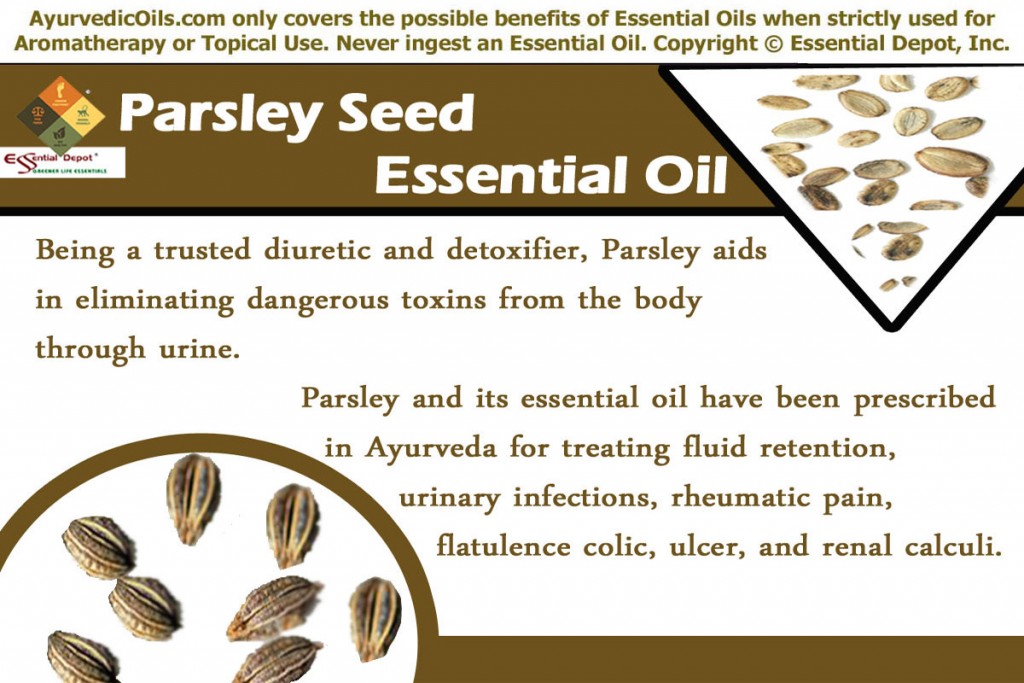 Parsley cannot be isolated just as a part of appetizing and aesthetic food presentation. More than just a culinary herb, Parsley leaves and its seeds are used throughout the world as a magnificent spice that kindle the taste and zest of the food to which it is added to. Scientifically known as Petroselinum sativum, Parsley is native to the eastern parts of the Mediterranean region.
Parsley cannot be isolated just as a part of appetizing and aesthetic food presentation. More than just a culinary herb, Parsley leaves and its seeds are used throughout the world as a magnificent spice that kindle the taste and zest of the food to which it is added to. Scientifically known as Petroselinum sativum, Parsley is native to the eastern parts of the Mediterranean region.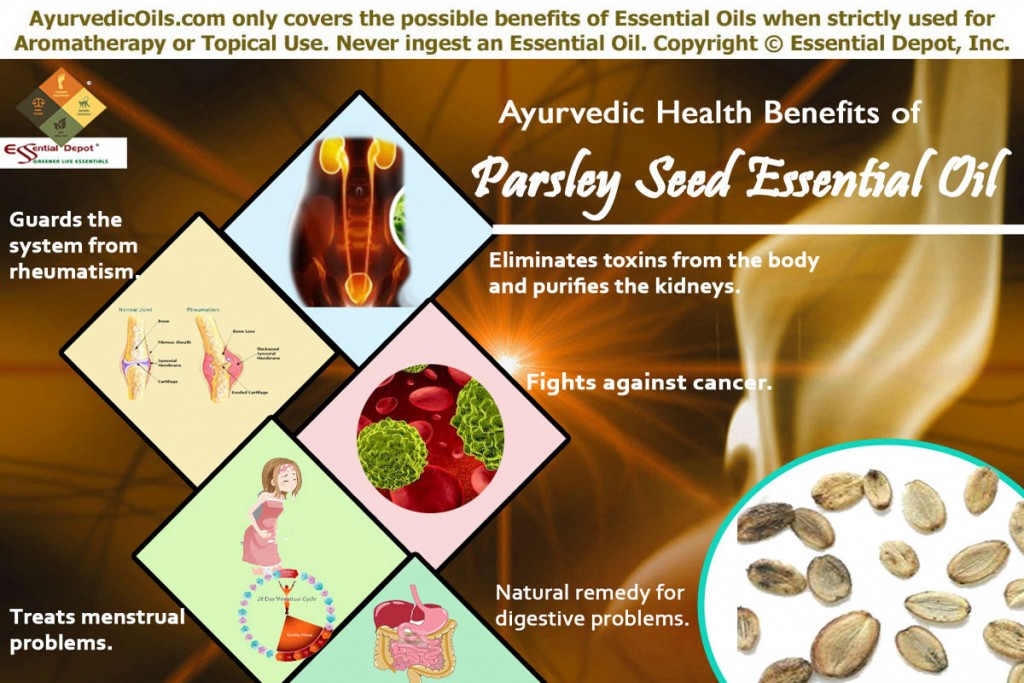 1. Eliminates toxins from the body and purifies the kidneys:
1. Eliminates toxins from the body and purifies the kidneys:
